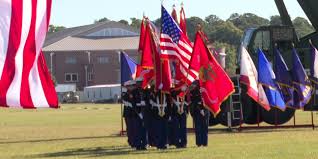The U.S. Marine Corps’ 250th Birthday: A Celebration of Valor or a Divisive Symbol of Militarism in a Fractured Nation?
As the United States Marine Corps approaches its 250th birthday on November 10, 2025, the nation finds itself at a crossroads. The Marine Corps, a symbol of bravery and sacrifice, has long been revered as a pillar of American strength. However, as the country grapples with deepening political divides, social unrest, and a reevaluation of national identity, the celebration of this milestone raises questions about the role of the military in contemporary society.
Montilio’s Bakery in Brockton, Massachusetts, is among those taking the lead in honoring the Marine Corps’ legacy. Known for its delectable cakes and pastries, the bakery is preparing to create a special cake to commemorate the Marines’ 250th birthday. This local initiative reflects a broader trend of communities across the nation rallying to celebrate the military’s storied history. Yet, while many view such celebrations as a tribute to the sacrifices made by service members, others perceive them as a glorification of militarism at a time when the nation is increasingly divided over issues of war, peace, and national security.
The Marine Corps has a rich history that dates back to its founding in 1775. Established during the American Revolutionary War, the Corps has played a pivotal role in numerous conflicts, from World War I and II to more recent engagements in Iraq and Afghanistan. The ethos of the Marine Corps—honor, courage, and commitment—has been instilled in generations of service members, fostering a sense of pride and camaraderie that transcends political affiliations. However, the Corps’ legacy is not without controversy. The military’s involvement in foreign conflicts has sparked debates about the ethical implications of war and the impact on civilian populations.
In cities like Nashville and Atlanta, Marines have hosted Marine Weeks, events designed to engage the public and showcase the Corps’ contributions to society. These gatherings often feature displays of military equipment, demonstrations of skills, and opportunities for community members to interact with service members. While these events aim to foster goodwill and appreciation for the military, they also highlight the growing disconnect between the military and civilian populations. Many Americans have never served in the armed forces, leading to a lack of understanding about the realities of military life and the sacrifices made by service members.
At Camp Lejeune, North Carolina, the U.S. Marine Corps celebrated its 250th birthday with a series of events that included parades, speeches, and ceremonies honoring fallen heroes. The celebration serves as a reminder of the Corps’ enduring commitment to protecting the nation and its values. However, as the military reflects on its past, it must also confront the challenges of the present. The increasing polarization of American society raises questions about the military’s role in bridging divides and fostering unity.
Prominent speakers at Marine Corps Birthday Balls often emphasize the importance of service and sacrifice, invoking a sense of patriotism and national pride. Yet, this rhetoric can be polarizing. For some, the celebration of military accomplishments is a source of inspiration; for others, it serves as a stark reminder of the consequences of war and the sacrifices made by those who do not return home. The juxtaposition of honoring military service while grappling with the realities of conflict creates a complex narrative that is difficult to navigate.
As the Marine Corps prepares for its 250th birthday, the nation must grapple with its own identity. The military has historically been a unifying force, but in an era marked by division, the celebration of its legacy may evoke mixed emotions. For some, the Marine Corps represents the best of American values—bravery, sacrifice, and dedication to duty. For others, it symbolizes a militaristic approach to foreign policy and a reluctance to engage in meaningful dialogue about peace and diplomacy.
The role of the military in American society is evolving. As the nation confronts pressing issues such as social justice, economic inequality, and climate change, the military’s involvement in these discussions becomes increasingly relevant. The Marine Corps, like other branches of the armed forces, must adapt to the changing landscape and find ways to connect with a diverse population that holds varying views on the military’s role.
In conclusion, the celebration of the Marine Corps’ 250th birthday is not merely a reflection of its storied past; it is a lens through which the nation can examine its present and future. As communities come together to honor the sacrifices of service members, they must also engage in meaningful conversations about the implications of militarism and the pursuit of peace. The Marine Corps stands as a testament to the resilience of the American spirit, but its legacy must be understood within the broader context of a nation striving for unity in the face of division.

